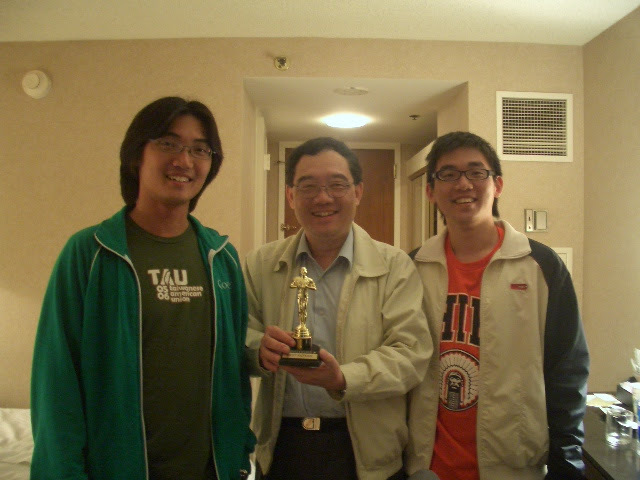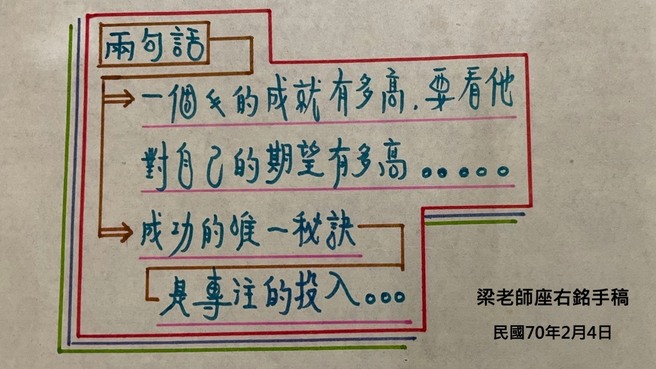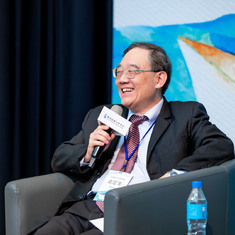May 23, 2021
家庭中的爸爸 - Our Dad at Home
2021年 5月22日
by Nigel Liang(梁乃強) and David Liang(梁乃元)
前言 Preface
我們的爸爸從我們有記憶以來就一直都在為著工作努力,小時候求學時期一直很怕爸,對爸的印象就是不茍言笑,一見面就問我 ”作業寫了沒?考試考幾分?”,加上爸工作繁忙,我們睡著後才回到家出門時卻都還沒起床,基本上很難見到面,因此小時候跟爸相處時,少的是喜悅多的是敬畏。長大懂事以後才知道,爸是因為對我們期待很高,要求嚴格追求卓越,就像他曾跟我說過”要做就要做到最好” 我至今都仍銘記在心。又因為知道我們當時求學最重要事情就是讀書,因此當時那些提問,是他對我們最深切的關心,只是可能因為工作繁忙疲累,表達的方式不同罷了。
我們很感恩爸爸的學生們在聽聞他逝世的消息後所有第一時間的關心與致意,甚至因為疫情的關係馬上決定要一起幫爸爸合辦線上的追思會並將框架設計出來,這種做法能很好地與爸爸的興趣跟專業契合,相信他也會感到很欣慰。因為知道爸爸雖然樂於分享家庭中發生的事物給學生知道但是比較少被家人分享關於他的事情,因此希望能用這個機會整理一些家人眼中的爸爸給大家知道。
Our dad was always busy with work. I was always afraid of him when I was young. My impression of him was that he never joked or laughed. Every time I saw him he would be asking about homework or exam scores. Plus, he was so busy, we hardly ever saw him. He wouldn’t get home until after we were asleep and would be off to work before we were up for school. Our relationship was one of reverence and veneration, not of laughter.
It was not until I grew up to be an adult did I realize that he had such high expectations of us. He would always tell us “If you are going to do something, do it the best” . We were in school at the time, so our only responsibility was to study and learn, so his asking about schoolwork was his form of caring deeply for us. He just expressed himself this way because of how overworked and tired he was.
We are very grateful for the condolences expressed by dad’s students and the rest of the community. The decision due to COVID to have an online memorial service also matches dad’s professional and personal interest. I’m sure he would be proud. I know that dad was keen to share stories about his family with his students, but you have probably very rarely heard about him from his family’s perspective. So, I hope to share some insight into how we, his children, see our father.
食- 吃遍山珍海味後仍鍾愛這一味
Culinary - His Favorite Cuisine
爸爸受外省家庭的影響,喜愛的食物以外省菜為主 - 我們家庭聚餐很常會吃餡餅粥, 牛肉麵或者是刀削麵這類的北方麵食餐館,加上一些豬耳朵, 小黃瓜, 花生米等小菜,就能讓平常在世界各地旅行參加會議,嚐遍五星飯店山珍海味的爸爸心滿意足。爸爸因為身體的關係不能吃太多奶製品,因此牛奶起司披薩這類的食物比較少會在聚餐中出現。他因為很喜歡打桌球運動,在打了幾個小時之後特別愛在巷子口的飲料店點一杯鳳梨冰茶或者是蜂蜜綠茶解渴。以前也偶而會在週末夜買鹹酥雞或是臭豆腐犒賞自己與家人一週的努力。這些飲食習慣雖然未必最健康,但是都是能讓爸爸持續做自己每天熱愛的事情、維持積極動能的燃料。
Our family was originally from the northern province of Henan in China and moved to Taiwan with the Nationalist army. As such, Dad’s pallet was heavily influenced by his upbringing and strongly favors Chinese northern cuisine. We often enjoy such delicacies as porridge, scallion pancakes or beef noodle soup with appetizers of pig ears, diced cucumbers or peanuts. He enjoyed these local foods more than he enjoyed fancy restaurant food. Dad was lactose intolerant, so foods like milk, cheese, or pizza would seldom be found at home. He loved ping pong. He often enjoyed a refreshing pineapple iced tea or green tea with honey after hours of ping pong. He also used to enjoy the occasional popcorn chicken or stinky tofu to share with family after a week's hard work. The diet may not be the most healthy of diets, but it was what he loved and helped fuel him to continue pursuing his passion.
衣 - 穿來穿去就是那幾件
Attire - Always the Same
爸爸在穿衣治裝上的投資跟他在科技產品上的投資相比可以說幾近於零,很多衣服好幾十年爸爸都能夠一直穿。對於爸爸來說,衣服沒有壞就好,可以穿就行。在穿衣服的選擇上爸爸首重舒適休閒,如果不是專業場合必要,常看到爸穿著涼鞋、短褲、polo衫出現,甚至可能因為他接下來有桌球的練習或者是比賽要參加,會直接穿著桌球裝出現。我覺得心態上可能對於爸爸來說心思應該花費在更重要的事情上吧!衣服沒破就好,有穿就行!
Dad would rather invest in technology products than in his wardrobe. There are some outfits that he has worn for decades. To dad, as long as his clothes weren’t worn through, he would keep wearing them. He valued comfort and leisure much more than appearances. Unless he was dressing up for a professional event, we would often see him in sandals, shorts, and a polo. If he had ping pong practice or a game, he might also wear his ping pong clothes to meetings. He cared much more about the content of the meeting or discussion than about appearances. Clothes were but an afterthought.
住 - 四海為家
Accommodation - the World was His Home
因為工作的關係,爸爸時常必須要南征北討四處旅行參加發表會、研討會等,有的時候可能昨天在香港,今天在上海,明天在美國,後天預計回台灣但可能臨時要改飛回香港。之前家裡也會打趣的說,爸爸搭早上的高鐵上台北開會下午又搭高鐵回來高雄上課,真的是把高鐵當成計程車在坐。從有記憶以來爸爸就是這樣的,可以說是四海為家,一個登機箱裡面放著的盥洗衣服跟筆記型電腦就是爸爸的旅行家當。但因為爸爸是做他熱愛的事情,從來沒有聽過他喊一聲累,我想這就真的是所謂的樂此不疲吧。
Dad was always traveling for work. He had an endless amount of conferences and meetings to attend. He sometimes went from Hong Kong to Shanghai to America in a few short days, with plans to return to Taiwan that got changed so that he needed to return to Hong Kong before returning home. He would often take the high speed rail to Taipei in the morning for a meeting, and take the HSR again to return to Kaohsiung for classes in the afternoon. We always joked that he was using the HSR as his own taxi service. I can’t remember a time when he wasn’t living out of his suitcase. But, he was doing what he loved, and never complained or said that he was tired. He truly loved what he was doing.
行 - 方便第一,安全第二
Transportation - Convenience over Safety
有記憶以來爸爸在當地短距離的移動都是靠四個輪子,假如目的地方便停車且時間允許的話就會自己開車,要不然就是會搭Uber、計程車,爸爸很少搭捷運或者是公車等大眾運輸工具,我想是因為對他來說上上下下手扶梯很花時間不是很有效率吧。他總是說時間好寶貴,寧可花一點錢快一點到目的地也不要省了通勤的錢但花了不必要的時間。
規劃旅程上爸爸也通常都會把時間抓得很緊,常常會讓家人們非常緊張。剩十五分鐘就要開始的聚餐,餐廳離家裡要二十分鐘車程他可能會在電腦前面做事情到剩十分鐘就要開始聚餐了才動身,不顧我們從三十分鐘前就在叮嚀他該出發了,媽媽都說爸爸心臟很大顆神經很大條,但其實我覺得是爸爸知道事情的輕重緩急,對於爸爸來說當下比較重要的是處理眼前的事情。
For as long as I can remember, dad preferred cars for transportation. If the situation allowed, he would drive, otherwise he would take an Uber or taxi. He seldom rode the bus or mass transit. I think he thought that going up and down escalators, through gates, and waiting for the bus or train was inefficient. He always said that time is valuable and he’d rather spend a bit more to get to his destination faster rather than waste time. When planning his itinerary, he usually planned a very tight schedule. This caused his family much anxiety. For an event that is 15 minutes away but takes 20 minutes to get there, he would often continue working until there is only 10 minutes left. We would start reminding him 30 minutes before, but he never would listen. Mom always said he had nerves of steel. But, I think dad just knew how to prioritize. To him, the work he was doing at hand was more important.
育 - 追求卓越的言(嚴) 教身教
Education - the Pursuit of Excellence
因為爸爸自己是學者的關係,對於我們小朋友的教育與期待是尤其高的,總是希望我們能夠受到良好的教育與訓練之後能出類拔萃並對社會做出貢獻。從懂事以來爸爸就一直是我們的榜樣,透過身體力行以身作則的方式教育我們各種做人處事的道理。求學時期除了叮囑我們要努力讀書之外,他也有意無意地會給予我們很多資訊管理、商業管理、科技產業相關的信息,像是把他書庫裡面的書讀了放在家中的角落或者是持續不間斷地訂閱商業周刊、財訊等雜誌等,這些都影響了我跟哥哥分別在商業與軟體開發不同領域的興趣,也都在攻讀到了碩士學位後在美國工作並持續在自己的專業上精進。如果不是因為爸爸給予我們的教育,我們絕對不會有今天的成就,這都要歸功於爸爸。
Because dad was an academic, he had high expectations for us to be educated and trained to be exceptional members of society. From when we were very young, dad was always our role model leading us by example. When we were in school, in addition to making sure we were working hard and excelling in our school work, he would often share with us knowledge about information management, business management, or the technology sector. For instance, he often would share books that he was reading with us, or share magazines that he subscribed to with us. These greatly impacted both of our choices to pursue business management and software engineering as careers. If it were not for dad’s education, we would not be where we are today.
樂 - 忘卻時間地唱歌、下圍棋與打桌球
Leisure - Singing, Go, and Ping Pong
爸爸在不同時期有不同時期的娛樂喜好,但整體來說爸爸最愛的休閒娛樂就是唱歌、下圍棋跟打桌球。十幾年前因為喜愛唱歌且想要把歌唱好,爸爸曾經投資一套卡拉OK系統讓我們能夠在家裡就能練唱歌曲,也買了錄音筆把歌聲錄下後重複聽來修正音準,再次驗證爸爸事情要做就要做到最好的處事原則。我記得他很喜歡唱張雨生的大海還有辛曉琪的味道,現在回憶起來都還能聽到他的歌聲。
下棋也是爸爸熱衷的事情,可以整個晚上觀看研究名人的棋局與棋譜,自己再去線上與他人切磋一番,我想透過棋局上的策略佈局跟攻城掠地的過程爸爸可以得到跟在工作上類似的成就感吧。後期爸爸因為朋友的影響跟注重健康的關係非常地熱衷打桌球,幾乎每一天晚上都會在工作完回到家後去社區的桌球室跟鄰居打球,除了真人對打之外也透過發球機去訓練回球的穩定度。我還記得好幾次跟著爸去練球他認真回旋球的架勢跟眼神,這些專注跟努力也讓爸爸在學校跟城市的桌球賽局中得到了不少獎牌的肯定,我們都很以他為榮!
Dad had different favorite pastimes at different stages of his life. In general, the three of his favorite activities were singing, Go, and ping pong. A decade or so ago, dad invested in a high end Karaoke system in our home to perfect his singing skills. He even bought a recording pen to record his singing and play it back so he could improve. He truly lived by his own standard to “do it the best”, even in leisure. I remember his favorite song was The Sea by Tom Chang and Wei Dao by Winnie Hsin. I can still hear him singing, even now. Go was also one of dad’s favorite pastimes. He could spend hours studying famous games and playing with people online. I think he enjoyed the feeling of achievement when playing Go that he enjoyed when working.
In recent years, dad started to enjoy ping pong for the health benefits and to play with his friends. Almost every night he would play with neighbors and friends after work. In ping pong, he also strived to be the best and would practice with a serving machine. I remember practicing with him a few times and seeing his focused posture and eyes. His focus and practice has earned him many troupes and awards in school and local ping pong tournaments. We are all very proud of him!
2021年 5月22日
by Nigel Liang(梁乃強) and David Liang(梁乃元)
前言 Preface
我們的爸爸從我們有記憶以來就一直都在為著工作努力,小時候求學時期一直很怕爸,對爸的印象就是不茍言笑,一見面就問我 ”作業寫了沒?考試考幾分?”,加上爸工作繁忙,我們睡著後才回到家出門時卻都還沒起床,基本上很難見到面,因此小時候跟爸相處時,少的是喜悅多的是敬畏。長大懂事以後才知道,爸是因為對我們期待很高,要求嚴格追求卓越,就像他曾跟我說過”要做就要做到最好” 我至今都仍銘記在心。又因為知道我們當時求學最重要事情就是讀書,因此當時那些提問,是他對我們最深切的關心,只是可能因為工作繁忙疲累,表達的方式不同罷了。
我們很感恩爸爸的學生們在聽聞他逝世的消息後所有第一時間的關心與致意,甚至因為疫情的關係馬上決定要一起幫爸爸合辦線上的追思會並將框架設計出來,這種做法能很好地與爸爸的興趣跟專業契合,相信他也會感到很欣慰。因為知道爸爸雖然樂於分享家庭中發生的事物給學生知道但是比較少被家人分享關於他的事情,因此希望能用這個機會整理一些家人眼中的爸爸給大家知道。
Our dad was always busy with work. I was always afraid of him when I was young. My impression of him was that he never joked or laughed. Every time I saw him he would be asking about homework or exam scores. Plus, he was so busy, we hardly ever saw him. He wouldn’t get home until after we were asleep and would be off to work before we were up for school. Our relationship was one of reverence and veneration, not of laughter.
It was not until I grew up to be an adult did I realize that he had such high expectations of us. He would always tell us “If you are going to do something, do it the best” . We were in school at the time, so our only responsibility was to study and learn, so his asking about schoolwork was his form of caring deeply for us. He just expressed himself this way because of how overworked and tired he was.
We are very grateful for the condolences expressed by dad’s students and the rest of the community. The decision due to COVID to have an online memorial service also matches dad’s professional and personal interest. I’m sure he would be proud. I know that dad was keen to share stories about his family with his students, but you have probably very rarely heard about him from his family’s perspective. So, I hope to share some insight into how we, his children, see our father.
食- 吃遍山珍海味後仍鍾愛這一味
Culinary - His Favorite Cuisine
爸爸受外省家庭的影響,喜愛的食物以外省菜為主 - 我們家庭聚餐很常會吃餡餅粥, 牛肉麵或者是刀削麵這類的北方麵食餐館,加上一些豬耳朵, 小黃瓜, 花生米等小菜,就能讓平常在世界各地旅行參加會議,嚐遍五星飯店山珍海味的爸爸心滿意足。爸爸因為身體的關係不能吃太多奶製品,因此牛奶起司披薩這類的食物比較少會在聚餐中出現。他因為很喜歡打桌球運動,在打了幾個小時之後特別愛在巷子口的飲料店點一杯鳳梨冰茶或者是蜂蜜綠茶解渴。以前也偶而會在週末夜買鹹酥雞或是臭豆腐犒賞自己與家人一週的努力。這些飲食習慣雖然未必最健康,但是都是能讓爸爸持續做自己每天熱愛的事情、維持積極動能的燃料。
Our family was originally from the northern province of Henan in China and moved to Taiwan with the Nationalist army. As such, Dad’s pallet was heavily influenced by his upbringing and strongly favors Chinese northern cuisine. We often enjoy such delicacies as porridge, scallion pancakes or beef noodle soup with appetizers of pig ears, diced cucumbers or peanuts. He enjoyed these local foods more than he enjoyed fancy restaurant food. Dad was lactose intolerant, so foods like milk, cheese, or pizza would seldom be found at home. He loved ping pong. He often enjoyed a refreshing pineapple iced tea or green tea with honey after hours of ping pong. He also used to enjoy the occasional popcorn chicken or stinky tofu to share with family after a week's hard work. The diet may not be the most healthy of diets, but it was what he loved and helped fuel him to continue pursuing his passion.
衣 - 穿來穿去就是那幾件
Attire - Always the Same
爸爸在穿衣治裝上的投資跟他在科技產品上的投資相比可以說幾近於零,很多衣服好幾十年爸爸都能夠一直穿。對於爸爸來說,衣服沒有壞就好,可以穿就行。在穿衣服的選擇上爸爸首重舒適休閒,如果不是專業場合必要,常看到爸穿著涼鞋、短褲、polo衫出現,甚至可能因為他接下來有桌球的練習或者是比賽要參加,會直接穿著桌球裝出現。我覺得心態上可能對於爸爸來說心思應該花費在更重要的事情上吧!衣服沒破就好,有穿就行!
Dad would rather invest in technology products than in his wardrobe. There are some outfits that he has worn for decades. To dad, as long as his clothes weren’t worn through, he would keep wearing them. He valued comfort and leisure much more than appearances. Unless he was dressing up for a professional event, we would often see him in sandals, shorts, and a polo. If he had ping pong practice or a game, he might also wear his ping pong clothes to meetings. He cared much more about the content of the meeting or discussion than about appearances. Clothes were but an afterthought.
住 - 四海為家
Accommodation - the World was His Home
因為工作的關係,爸爸時常必須要南征北討四處旅行參加發表會、研討會等,有的時候可能昨天在香港,今天在上海,明天在美國,後天預計回台灣但可能臨時要改飛回香港。之前家裡也會打趣的說,爸爸搭早上的高鐵上台北開會下午又搭高鐵回來高雄上課,真的是把高鐵當成計程車在坐。從有記憶以來爸爸就是這樣的,可以說是四海為家,一個登機箱裡面放著的盥洗衣服跟筆記型電腦就是爸爸的旅行家當。但因為爸爸是做他熱愛的事情,從來沒有聽過他喊一聲累,我想這就真的是所謂的樂此不疲吧。
Dad was always traveling for work. He had an endless amount of conferences and meetings to attend. He sometimes went from Hong Kong to Shanghai to America in a few short days, with plans to return to Taiwan that got changed so that he needed to return to Hong Kong before returning home. He would often take the high speed rail to Taipei in the morning for a meeting, and take the HSR again to return to Kaohsiung for classes in the afternoon. We always joked that he was using the HSR as his own taxi service. I can’t remember a time when he wasn’t living out of his suitcase. But, he was doing what he loved, and never complained or said that he was tired. He truly loved what he was doing.
行 - 方便第一,安全第二
Transportation - Convenience over Safety
有記憶以來爸爸在當地短距離的移動都是靠四個輪子,假如目的地方便停車且時間允許的話就會自己開車,要不然就是會搭Uber、計程車,爸爸很少搭捷運或者是公車等大眾運輸工具,我想是因為對他來說上上下下手扶梯很花時間不是很有效率吧。他總是說時間好寶貴,寧可花一點錢快一點到目的地也不要省了通勤的錢但花了不必要的時間。
規劃旅程上爸爸也通常都會把時間抓得很緊,常常會讓家人們非常緊張。剩十五分鐘就要開始的聚餐,餐廳離家裡要二十分鐘車程他可能會在電腦前面做事情到剩十分鐘就要開始聚餐了才動身,不顧我們從三十分鐘前就在叮嚀他該出發了,媽媽都說爸爸心臟很大顆神經很大條,但其實我覺得是爸爸知道事情的輕重緩急,對於爸爸來說當下比較重要的是處理眼前的事情。
For as long as I can remember, dad preferred cars for transportation. If the situation allowed, he would drive, otherwise he would take an Uber or taxi. He seldom rode the bus or mass transit. I think he thought that going up and down escalators, through gates, and waiting for the bus or train was inefficient. He always said that time is valuable and he’d rather spend a bit more to get to his destination faster rather than waste time. When planning his itinerary, he usually planned a very tight schedule. This caused his family much anxiety. For an event that is 15 minutes away but takes 20 minutes to get there, he would often continue working until there is only 10 minutes left. We would start reminding him 30 minutes before, but he never would listen. Mom always said he had nerves of steel. But, I think dad just knew how to prioritize. To him, the work he was doing at hand was more important.
育 - 追求卓越的言(嚴) 教身教
Education - the Pursuit of Excellence
因為爸爸自己是學者的關係,對於我們小朋友的教育與期待是尤其高的,總是希望我們能夠受到良好的教育與訓練之後能出類拔萃並對社會做出貢獻。從懂事以來爸爸就一直是我們的榜樣,透過身體力行以身作則的方式教育我們各種做人處事的道理。求學時期除了叮囑我們要努力讀書之外,他也有意無意地會給予我們很多資訊管理、商業管理、科技產業相關的信息,像是把他書庫裡面的書讀了放在家中的角落或者是持續不間斷地訂閱商業周刊、財訊等雜誌等,這些都影響了我跟哥哥分別在商業與軟體開發不同領域的興趣,也都在攻讀到了碩士學位後在美國工作並持續在自己的專業上精進。如果不是因為爸爸給予我們的教育,我們絕對不會有今天的成就,這都要歸功於爸爸。
Because dad was an academic, he had high expectations for us to be educated and trained to be exceptional members of society. From when we were very young, dad was always our role model leading us by example. When we were in school, in addition to making sure we were working hard and excelling in our school work, he would often share with us knowledge about information management, business management, or the technology sector. For instance, he often would share books that he was reading with us, or share magazines that he subscribed to with us. These greatly impacted both of our choices to pursue business management and software engineering as careers. If it were not for dad’s education, we would not be where we are today.
樂 - 忘卻時間地唱歌、下圍棋與打桌球
Leisure - Singing, Go, and Ping Pong
爸爸在不同時期有不同時期的娛樂喜好,但整體來說爸爸最愛的休閒娛樂就是唱歌、下圍棋跟打桌球。十幾年前因為喜愛唱歌且想要把歌唱好,爸爸曾經投資一套卡拉OK系統讓我們能夠在家裡就能練唱歌曲,也買了錄音筆把歌聲錄下後重複聽來修正音準,再次驗證爸爸事情要做就要做到最好的處事原則。我記得他很喜歡唱張雨生的大海還有辛曉琪的味道,現在回憶起來都還能聽到他的歌聲。
下棋也是爸爸熱衷的事情,可以整個晚上觀看研究名人的棋局與棋譜,自己再去線上與他人切磋一番,我想透過棋局上的策略佈局跟攻城掠地的過程爸爸可以得到跟在工作上類似的成就感吧。後期爸爸因為朋友的影響跟注重健康的關係非常地熱衷打桌球,幾乎每一天晚上都會在工作完回到家後去社區的桌球室跟鄰居打球,除了真人對打之外也透過發球機去訓練回球的穩定度。我還記得好幾次跟著爸去練球他認真回旋球的架勢跟眼神,這些專注跟努力也讓爸爸在學校跟城市的桌球賽局中得到了不少獎牌的肯定,我們都很以他為榮!
Dad had different favorite pastimes at different stages of his life. In general, the three of his favorite activities were singing, Go, and ping pong. A decade or so ago, dad invested in a high end Karaoke system in our home to perfect his singing skills. He even bought a recording pen to record his singing and play it back so he could improve. He truly lived by his own standard to “do it the best”, even in leisure. I remember his favorite song was The Sea by Tom Chang and Wei Dao by Winnie Hsin. I can still hear him singing, even now. Go was also one of dad’s favorite pastimes. He could spend hours studying famous games and playing with people online. I think he enjoyed the feeling of achievement when playing Go that he enjoyed when working.
In recent years, dad started to enjoy ping pong for the health benefits and to play with his friends. Almost every night he would play with neighbors and friends after work. In ping pong, he also strived to be the best and would practice with a serving machine. I remember practicing with him a few times and seeing his focused posture and eyes. His focus and practice has earned him many troupes and awards in school and local ping pong tournaments. We are all very proud of him!




